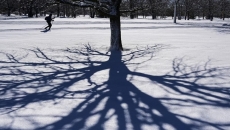Long-term care residents in British Columbia will soon be allowed more than one visitor and to give their loved ones a hug after more than a year of tough restrictions to limit the spread of COVID-19.
Provincial health officer Dr. Bonnie Henry announced Thursday that she would remove a requirement for a single designated visitor and allow multiple family members and friends to visit elders in care facilities as of April 1.
Starting April 1, family and friends can visit their loved ones in long-term care and assisted living facilities more regularly. All social visits still need to be scheduled in advance.
— BC Government News (@BCGovNews) March 25, 2021
(1/4) #CovidBC
There are some restrictions, including that only two visitors plus a child will be allowed at one time and that people are asked not to visit more than one care-home resident. Physical touch will be allowed, but hand hygiene and masks should still be routine, Henry said.
"The reality is that it is likely we are going to have more outbreaks in care homes now that we're allowing more people to come into those care homes," she said.
"But we're at a point where the benefits of having those social connections and interactions outweigh the risks, and we know that we can manage those risks with the vast majority of residents and staff now being protected with immunization."
Rules will be changed to allow family and friends to visit in residents' rooms without staff monitoring for a minimum of 60 minutes.
• Visits for a minimum of 60 minutes
— BC Government News (@BCGovNews) March 25, 2021
• Physical touch between residents & their visitors with infection prevention & control measures in place
• Support to leave the facility for family visits (not just essential outings) & will not be required to isolate upon return.
(3/4)
The announcement came as B.C. reported 800 new cases on Thursday, the highest daily total since November. The province also reported five fatalities, bringing the death toll to 1,446 since the start of the pandemic.
Henry said the province is also easing restrictions within care homes, removing physical distancing requirements between residents and resuming communal dining. Residents can also go on outings with no requirement for isolation upon return.
Asked about a University of British Columbia study that found long-term care residents had a weaker immune response to their first dose than healthy adults, Henry said the study looked at antibody levels in 18 people, a relatively small cohort.
She said it's not yet known how much antibodies reflect how protected a person is, and there have been other studies, including one in the United Kingdom that looked at larger groups of people, that showed a high level of protection for a longer period of time.
"We're learning as we go," she said, adding the province will continue to monitor the data.
Henry also announced that the province will allow indoor religious services from Sunday to May 13 to allow worship during important holidays including Passover, Easter, Ramadan and Vaisakhi.
She said she's hopeful that indoor services can be extended after that period, but the decision was made against the backdrop of increasing case numbers and if changes have to be made, they will.
The maximum capacity is 50 people, or 10 per cent of the worship space capacity, whichever is less, and there are a number of safety requirements and protocols that must be met, the province said.
Henry provided more details about an increase in the number of young people who have required hospitalization and intensive care for COVID-19.
There has been an increase in cases in people aged 19 to 39 over the past month and a half, at the same time that there have been decreases in people over 80 as older age groups get vaccinated, she said.
However, she said the hospitalization rate remains low and stable for people under 60. There have been more cases of the variant first identified in the U.K., which is more transmissible and can have increased severity of illness across age groups.
Of 1,592 hospitalizations of people under 60 in B.C., 19 per cent required admission to intensive care units. Of the small number that required hospitalization with a variant of concern, 30 per cent were admitted to the ICU, she said.
"That's something that's a signal, that we're watching," she said, though she added the numbers are small enough not to be too worrying.
Henry also revealed that a third to 40 per cent of B.C.'s cases are coming from work sites. She said COVID-19 is emerging in "work sites across the board," though the province is currently targeting essential workplaces that have seen outbreaks for vaccines.
The B.C. government announced earlier Thursday it is more than doubling the fines for those promoting and attending events against COVID-19 health rules in an effort to crack down on "selfish behaviour."
The fine has increased to $575 from $230, although the penalty for those caught hosting such an event remains at $2,300.
Public Safety Minister Mike Farnworth said most people are following provincial health rules, but it's become clear in the last few months that the risk of a ticket isn't enough of a deterrence for some.
"The reality is this, these health orders exist to keep people safe, to help deal with the spread of COVID-19 and everybody has a part to play," he said. "I think (the fines) send a pretty strong message for people that they need to follow provincial health orders."
The $230 fine will continue to apply to a range of other COVID-19 violations, such as not wearing a mask.
The increased fine is aimed at events where behaviour is more risky than other offences, Farnworth said.
Farnworth said as of Wednesday, 1,525 people have received tickets.
He said the province is also preparing to announce new measures in the coming weeks to ensure people who receive tickets pay their fines.






